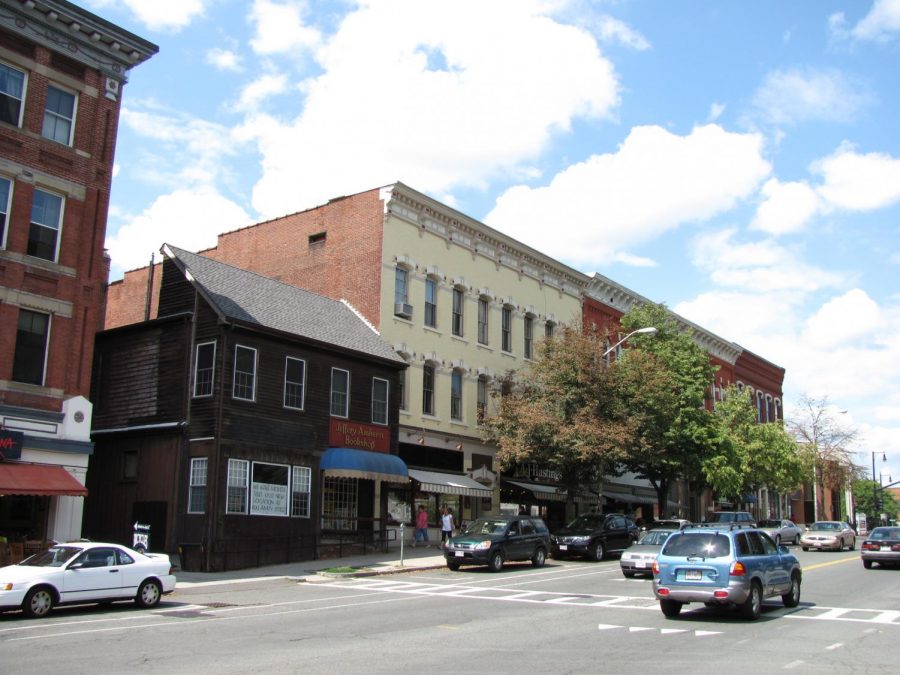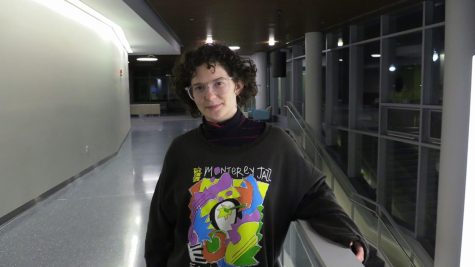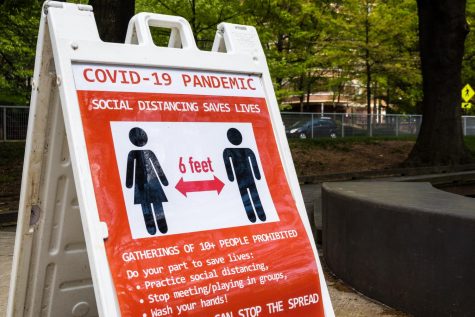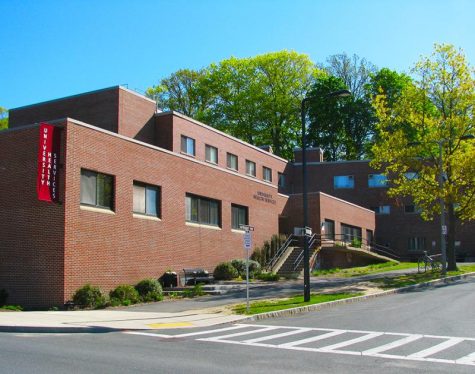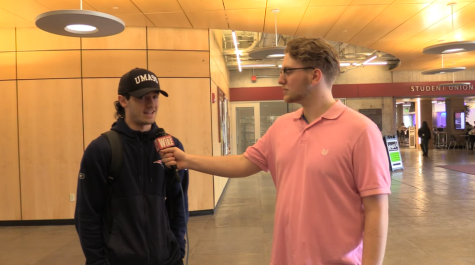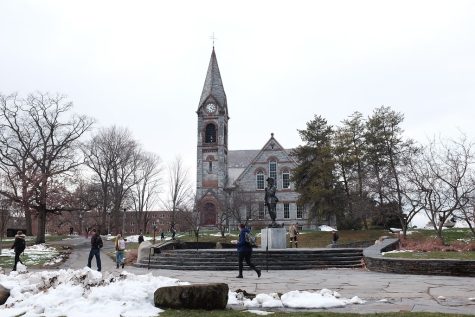Employed students sacrifice basic needs for new sequester policy
UMass posture changes students sent scrambling and created an uproar out across numerous social media platforms
This article reflects the course of events following Chancellor Kumble R. Subbaswammy’s email announcement that ordered UMass students to sequester. From Feb. 7, 2021, to Feb. 12, 2021, great uncertainty remained about student’s ability to be actively employed. On Feb, 12, this status changed when UMass announced on-campus employees would be paid during this time.
On Feb. 7, UMass ordered students to “sequester in place” after raising the COVID-19 risk level from “Elevated” to “High Risk.” Almost immediately off-campus workers were informed by their employers that due to these status changes they could not work until the two-week period ended without risking suspension by the university. On-campus student employees were also not allowed to work in person for the two weeks the posture will be in place, even if they live off-campus. These rules frequently changed and left off-campus workers facing the choice of unemployment or suspension.
Charlotte Bailey, a UMass student who works at a Whole Foods located in Hadley, initially assumed her work was essential. However, word spread fast to her supervisor. “One of my higher-ups asked me to explain what the ’high risk’ announcement even meant. I told her that they were strongly recommending students to only leave their residence for essential reasons…I thought my job was essential because my income is to pay for my off-campus housing.”
While Sam Napolitano, another Whole Foods worker was working when UMass released their email statement. “I was extremely worried as my graduation is riding on the one in-person class that I do have. I actually had to be sent home because I was crying so much and I couldn’t calm down.”
The next day at the store a higher up approached Bailey. “She asked if I went to UMass and informed me there was a possibility of us having to leave for two weeks. I was confused and surprised. She told me to contact my advisor or someone who could tell me if I was allowed to work.”
Bailey continued her shift until the same supervisor returned an hour later. “She approached me again and said ’We’re asking you and everyone else to leave’… I was obviously taken aback and asked ’As in right now?’ She apologized and continued to the next UMass student, asking every individual to go home.”
“We fear that UMass could kick us out for the semester if we do not obey their ‘strong recommendations.’ I was told by many who saw my post to file for unemployment as we do not know if we will get any compensation or PTO. I am a safe student who gets tested twice a week and only leaves for work.” Bailey said.
After the mass removal of UMass student employees, Zach Neuman, a third employee at the same Whole Foods, was contacted by his boss several times on Monday, Feb. 8. At first, this boss clarified, “‘For the time being don’t come in, we’re trying to figure it out.’ Then they called me back again saying that we’re allowed to work, but that we need to be wary of the consequences UMass might give to us.”
When Neuman attempted to confirm if disciplinary action could be taken by calling the school, he hit multiple dead ends. “I was trying to find out if UMass would actually take disciplinary action against people working”
“I called the registrar and they didn’t know the answers so they sent me to EHS (Emergency Health Services).” Emergency Health Services lacked a clear answer and sent Neuman to the Public Health Promotion Center. “It went to some guy’s voicemail, and the voicemail was full and it just hung up. So absolutely nothing.” Napolitano also attempted to find information through her advisor, but “my advisor has just told me he will get back to me. It’s been a couple days since then though.” As of Saturday morning, she still had not heard back from him.
At first Maxine Bouvier, a personal friend of the author, a UMass sophomore and Lowe’s employee hadn’t received a call from her boss. Wednesday morning, her employer notified Bouvier that she could work if she wanted to but it was not required while the guidance was in place. Despite having contracted COVID-19 in 2020, potentially with a lower chance of contracting or transmitting the virus again, she plans to take the next few weeks off due to the threat of suspension.
“I usually work around 20 hours a week. I’m too scared of being suspended [from UMass] to continue working until the semester ends” Bailey reiterated Bouvier’s fear. Neuman said, “I have enough money to pay next month’s rent but that’s it… I pay for a lot of my own stuff. Working is nice because I do have extra spending money. But it’s all it’s need-based…I work because I need to not because I want to.”
On Tuesday night, Feb. 9, UMass unveiled the Student Employment Assistance Grant program. In an effort to compensate students for potential lost employment during the sequestration, the university has made grants available by application until Friday, Feb. 19. The grants awards are upwards of $300 per student. According to an Amherst House Market Study in 2015, the average rent for a room in a house with a private kitchen was $724 at the time while an apartment unit was $603.
“There is not a single house or apartment in this area that the rent is anywhere near $300. That is half a paycheck for me and even with a full paycheck I still have to choose between rent and food sometimes. This doesn’t even include utilities or other expenses such as medication or medical devices that I and many others have to pay for. For some people, $300 doesn’t even cover the cost of books and it is nowhere near enough to pay off a loan for living on campus. It’s honestly just another slap in the face from UMass” Napolitano said.
Napolitano felt uncertain about her next step financially. “I’m starting to look up loans and I applied for a PUA but I’m an out-of-state student so that might not work. I think I might have to go to work and hope for the best.”
Bailey noted the time it would take to receive the grant.”It doesn’t seem sustainable and it seems as if there is limited eligibility with the need for a note from your work. I’m glad they clarified and I understand their choice…Though I think applying for this grant as well as applying for pandemic unemployment pay both takes time and we won’t receive the money in a timely manner. I think they should be required to have a negative COVID-19 test, or more than one, and then be allowed to work as long as they aren’t affiliated with campus.”
If losing their paycheck wasn’t enough, students fed by their employers may suffer from food insecurity. Ilsa Kraft, a UMass student working for the Hangar Pub and Grill in Amherst, said, “I am not worried about being able to get back on employment.” while two of her co-workers “were very worried about how they are going to pay for rent this month and get food since they rely on the Hangar job for a good amount of their meals.” The Hangar provides them with free meals for the duration of their shifts.
“If the university actually cared to make sure every student wasn’t negatively affected by this. They would have asked how much we all needed” Kraft added.
Some students haven’t received any notice from their employers or are self-employed and plan on working despite the restriction. Bouvier’s boyfriend, Andrew Harnett, a junior and a driver for DoorDash, is a contract worker as opposed to an employee. Due to his lack of a direct supervisor, he plans to continue working and doesn’t feel he is at risk of a suspension. “I don’t think anything is gonna happen because there are so many DoorDashers in the Amherst area who aren’t students…There wouldn’t be any way for DoorDash to find out that I’m a student.”
Harnett added, “I probably wouldn’t have stopped working if the grant was more money, wouldn’t be worth it for me financially.”
Amanda, a UMass senior working as a server in the Amherst Area who did not wish to disclose her last name, was not contacted by her employer about the policy originally planned on going into work. “I have to pay for my own groceries and gas and rent. I work pretty hard to save portions of my paycheck in order to pay for those things. I also just don’t feel like a $300 grant makes up for like 2 weeks, 32 hours for me, of lost work” she said over text on Wednesday. In a follow up on Saturday, Feb. 13, she changed her mind. Amanda “decide[d] to stop working for the duration of the quarantine” due to the danger of losing her scholarship if she was reported.
The university’s new guidelines have other major impacts on her life. “I also think it’s unfair that off-campus students are asked to ‘self sequester’ when we don’t have access to dining halls or laundry services. We have to leave our house to get groceries and do laundry. There’s not really a way around that unless you want to spend a lot of money, which many of us don’t want to do because we are now out of work,” she stated on Wednesday.
“Unfortunately I probably will have to break the rule. obviously, I’ll try my hardest but I don’t really have the money to pay for special delivery services for basic needs right now.” Amanda said.
Bouvier agreed, “I’m frustrated because while I understand the concerns of spreading the disease pretty intimately and how awful it can be, it feels like the university didn’t plan in advance and is taking sweeping action that really negatively impacts me and a lot of other in order to make up for something that could’ve been avoided”
Like Amanda, Bouvier and other students who have practiced social distance since their summer 2020 return to Amherst, Neuman felt frustrated by the restrictions and off-campus behavior that resulted in them.”Just my luck, I get through…the pandemic without getting COVID and like I end up getting it from some kid that decided to party [a few weeks] before I can get vaccinated,” Neuman lamented.
“I only take eight credits, I’m a part-time student…I stay safe. I follow the rules. I do my online classes, I go to work. That’s kind of it” Neuman stated.
On-campus student workers echoed similar frustrations and had further difficulties communicating with UMass. A worker at Worcester Dining Commons requested not to be named due to her university employment. She had yet to begin her first shift, scheduled for Monday, Feb. 8, when she received an email from her boss. “On Sunday, probably around noon, they sent us an email saying there was a ban on students working on campus,” she recalled.
She continued, “I was really looking forward to working not only because of the money, but just like to get out and like, be on campus…It was really disappointing.”
“Even if they made me get tested three or four times a week or even five, I would have done it…I need to work,” she emphasized over and over.
By Tuesday morning, the situation had shifted when she received a new email from her boss. She could start working again and “they are only having some students back right now based on what shifts they have and their qualifications. The communication is awful. They told us we could not work on Sunday and now some of us can which..is not fair to those who still can’t” she disclosed in a text.
Another student employed on campus, who would also prefer not to be named because of her university employment, remembered Tuesday morning. “I found out on my way [to work] that students were no longer able to work until the quarantine was lifted.”
For this student not working for these two weeks means “I’m going to have to ask my parents for help to cover my rent this month, and we’ve had to cut down on our typical budget for groceries. Although any help is appreciated, $300 doesn’t exactly cover what’s needed. I think students would receive more help if they were to file through PUA.”
The threat of a posture extension and the possibility of a prolonged period of unemployment weighed heavily on her mind. “That’s what’s most stressful about all of this. If I’m out of work for much longer I’m not sure how I’m going to be able to afford to stay here,” she said.
She added, “Not being able to work sucks, but if it’s what I need to do to ensure the safety of my coworkers who don’t attend UMass, then it’s what has to be done. I don’t think people realize how their actions don’t just affect the UMass community. It’s affecting the entire Amherst community and contributing to an increase in cases throughout MA as a whole. Hopefully, this will serve as a wake-up call for many students and people will begin taking things more seriously”
By Friday, Feb. 12, the situation had shifted for on-campus workers but not those off-campus. UMass agreed to pay all on-campus student workers for their originally scheduled work. The undergraduate student who works on campus stated, “It’s definitely helpful for those who work on campus, but it does nothing for those who work off-campus, which is a larger majority.” She found out through, “I just heard from friends [and] social media” not through her boss or the university.
“My view of the administration was already tainted when they allowed freshmen with no in-person classes back on campus but now I have absolutely no respect for them…They are also very ableist in how they have dealt with this situation. I [and] many others are immunocompromised and are being forced to go to campus and risk our lives just to get a degree. Now, I might not even get that degree and I already have a job and apartment set up in another city for May. I will now view my undergraduate experience as just a horrible period of my life” Napolitano expressed.
Community Resources for Students Experiencing Financial Issues due to the Temporary Loss of Employment:
Email Talia at [email protected] or follow them on Twitter @HeiseyTalia

